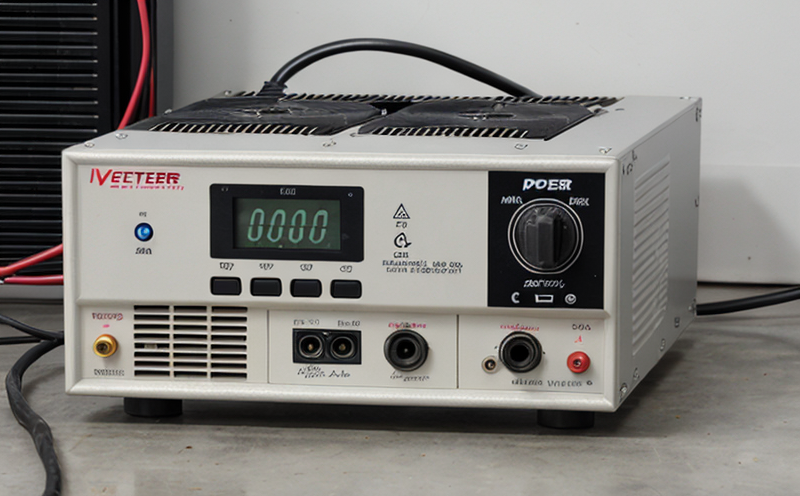CEN EN 50526 Power Conversion Efficiency Testing for Renewables
The CEN EN 50526 standard is a critical tool in ensuring the reliability and efficiency of power conversion systems, particularly within renewable energy contexts. This test focuses on measuring the power conversion efficiency (PCE) of inverters and other power electronics used in solar photovoltaic (PV), wind, and other renewable energy systems.
Power conversion efficiency is a key metric that determines how effectively an inverter converts DC electricity from solar panels or wind turbines into AC electricity suitable for use by homes and businesses. Ensuring high PCE compliance with CEN EN 50526 is crucial not only for regulatory adherence but also to minimize energy losses, enhance system performance, and extend the operational life of renewable energy installations.
This testing process involves several critical steps: first, the inverter or power electronic device under test (DUT) undergoes a detailed pre-test inspection. This ensures that all components are correctly installed and that no issues exist prior to testing. Next, the DUT is subjected to a series of operating conditions that simulate real-world scenarios. These include varying input voltage levels, temperature gradients, and different power load demands.
The performance under these conditions is then measured using high-precision measurement equipment. The results are compared against established thresholds defined by CEN EN 50526 to ensure compliance with the standard's requirements for efficiency, stability, and safety. A non-compliant device may not only fail testing but also pose risks in a real-world environment.
Compliance with this standard is essential for manufacturers of renewable energy systems as it helps them demonstrate their commitment to quality and reliability. It also ensures that the products they bring to market meet both local and international regulatory requirements, thereby facilitating smoother market entry and acceptance.
| Key Parameters | Description |
|---|---|
| PCE Measurement | The ratio of output power to input power for the inverter during conversion. This is measured under specific operating conditions defined by CEN EN 50526. |
| Operating Conditions | Includes variations in input voltage, temperature, and load demand to simulate real-world usage scenarios. |
| Data Collection | Precision measurement equipment records data on the efficiency of the inverter under various conditions. |
| Compliance Testing | Evaluates whether the measured PCE meets the specified thresholds outlined by CEN EN 50526. |
The testing process is not merely a compliance exercise but also an opportunity for continuous improvement. By identifying areas where efficiency can be enhanced, manufacturers can refine their products to meet increasingly stringent standards and customer expectations. This ultimately contributes to the broader goal of promoting sustainable energy solutions.
Scope and Methodology
- Input Voltage Variations: The inverter is tested under a range of input voltage conditions, including nominal, minimum, and maximum values as specified by CEN EN 50526.
- Temperature Gradients: Testing occurs at various ambient temperatures to simulate different operational environments.
- Loading Conditions: The inverter is subjected to a series of loading conditions to ensure it operates efficiently under all expected loads.
The methodology involves precise measurement and recording of the power conversion efficiency using specialized equipment. This process ensures accurate determination of compliance with CEN EN 50526 standards, which are critical for ensuring the reliability and performance of renewable energy systems.
Quality and Reliability Assurance
To ensure consistent quality and reliability in our testing services, we implement a robust quality assurance program. This includes regular calibration of test equipment, adherence to international standards such as ISO/IEC 17025 for laboratory accreditation, and continuous training of our technical staff.
- Calibration: All measurement instruments are regularly calibrated to ensure accuracy and precision.
- Audits: Internal audits are conducted periodically to maintain compliance with quality standards.
- Training: Our team undergoes continuous professional development to stay updated on the latest testing methodologies and technologies.
These measures not only enhance the reliability of our testing results but also provide clients with confidence in the accuracy and integrity of their test data. By adhering strictly to CEN EN 50526 standards, we ensure that our services meet the highest industry benchmarks.
Competitive Advantage and Market Impact
Our service offering provides a competitive advantage by ensuring that clients are at the forefront of regulatory compliance. By being among the first to achieve and maintain CEN EN 50526 certification, we enable our clients to differentiate themselves in the market.
Compliance with this standard enhances the reputation of manufacturers and suppliers within the renewable energy sector. It demonstrates a commitment to quality and reliability that can significantly influence customer trust and brand loyalty. Moreover, it facilitates smoother regulatory processes, reducing compliance risks and costs for our clients.
The service also supports innovation by providing detailed insights into efficiency improvements. This knowledge can be leveraged to enhance product offerings, reduce energy losses, and increase overall system performance. As a result, manufacturers and suppliers can stay ahead of the competition in terms of both regulatory compliance and market positioning.





